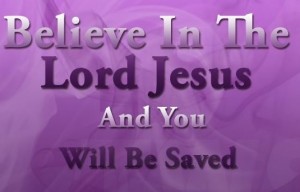In Jeremiah 4:5, He called for the sounding of the trumpet in Judah and Jerusalem. Ryken says, “The rams’ horns are sounding all over Judah, like so many civil defense sirens, warning the people to run for the walled cities. This is the first sign that something is amiss.” Then  in verse 6 Jeremiah calls for more alarms to be raised. Ryken goes on, “Then a signal flag is raised in Jerusalem, or perhaps a fire beacon is lit, warning the Judeans to gather within the walls of Zion. ‘Raise the signal to go to Zion! Flee for safety without delay!’ There is not a moment to lose!”[1] Jeremiah 4:6 reads, “Raise a standard toward Zion, flee for safety, stay not, for I bring disaster from the north, and great destruction.” The translator’s handbook describes the phrase, “stay not.” It says, “Flee for safety, stay not: Stay not is more literally ‘Don’t stand.’ The meaning is ‘Don’t delay!’ (tev). Many translations follow the text and tev and have two short commands, but it is also possible to express the idea as “run for safety without delay.”[2]
in verse 6 Jeremiah calls for more alarms to be raised. Ryken goes on, “Then a signal flag is raised in Jerusalem, or perhaps a fire beacon is lit, warning the Judeans to gather within the walls of Zion. ‘Raise the signal to go to Zion! Flee for safety without delay!’ There is not a moment to lose!”[1] Jeremiah 4:6 reads, “Raise a standard toward Zion, flee for safety, stay not, for I bring disaster from the north, and great destruction.” The translator’s handbook describes the phrase, “stay not.” It says, “Flee for safety, stay not: Stay not is more literally ‘Don’t stand.’ The meaning is ‘Don’t delay!’ (tev). Many translations follow the text and tev and have two short commands, but it is also possible to express the idea as “run for safety without delay.”[2]
Dearman suggests, “Judah and Jerusalem are called to assemble, to put on sackcloth, and to lament the approach of a foe from the north. The approach of this enemy is in reality the approach of the Lord, who comes against the people like a lion or whose blast of anger is like a searing wind. God is a warrior (Ex. 15:3), but in this context the divine warrior comes against his own people.”[3] God is coming against His own people because His own people have turned from God to a religious system of rituals, rules, and regulations. The heart of God’s presence with His people is in danger because the heart of God’s people is not with Him. The destruction of Jerusalem and its religious system is inevitable unless the people turn their hearts toward home – not a place, but their God.
In Jeremiah 6, he will sound more trumpets but the call will be different at that point. Davidson says, “In 4:5–6 the people were warned to flee to safety from the indefensible countryside into the fortified cities, none greater, none more inviting than Jerusalem. Here Jeremiah counsels ‘the people of Benjamin’, his own fellow-tribesmen (1:1), to flee from Jerusalem. Instead of offering security it is a death-trap.”[4] Even now for those who will believe God’s word through His prophet Jeremiah, there is a way of escape! The remnant will be preserved for 70 years outside their land and be brought back when the sabbatical years that have been ignored are fulfilled in the land. All religious ritual is a death trap! One cannot trust ritual, rules, and regulations as their means of salvation. It’s a matter of applying the blood of the lamb upon the doorposts of our hearts. It’s a matter of hearing God’s word and believing! The Philippian Jailor cried out in the presence of his inevitable destruction, “what must I do to be saved?” Paul answered, “Believe in the Lord Jesus Christ and you will be saved.” Flee religion! Run to Jesus!
[1] Philip Graham Ryken, Jeremiah and Lamentations: From Sorrow to Hope, Preaching the Word (Wheaton, IL: Crossway Books, 2001), 74.
tev Today’s English Version
tev Today’s English Version
[2] Barclay M. Newman Jr. and Philip C. Stine, A Handbook on Jeremiah, UBS Handbook Series (New York: United Bible Societies, 2003), 124.
[3] J. Andrew Dearman, Jeremiah and Lamentations, The NIV Application Commentary (Grand Rapids, MI: Zondervan Publishing House, 2002), 86.
[4] Robert Davidson, Jeremiah, vol. 1, The Daily Study Bible Series (Louisville, KY: Westminster John Knox Press, 1983), 61.